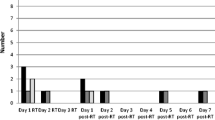Abstract
Goals of work
To document the use of steroids and frequency of their side effects in patients with brain metastases.
Patients and methods
A survey of oncologists who manage patients with brain metastases was conducted to document steroid prescribing practice in our institution. In addition, a retrospective chart review of 88 patients treated with whole brain radiotherapy (WBRT), identified through the Palliative Radiation Oncology Program database, was conducted for a 6-month period to documents steroid doses prescribed, tapering schedules, and steroid side effects.
Results
Ninety percent of physicians responded to the survey. Forty-five percent routinely used dexamethasone 4 mg qid (16 mg/day). The others determined the dose of steroid according to the presence or absence of neurological symptoms. Sixty percent tapered the patient’s steroids over the 4 weeks following completion of WBRT. The most common side effects noted by physicians were: increased appetite or weight gain (46%), insomnia (24%), gastro-intestinal symptoms (20%). In the retrospective study, dexamethasone 4 mg qid was prescribed to 52% patients prior and during WBRT. Sixty-six percent of patients were instructed to taper dexamethasone after WBRT, but details were not provided. The most frequently documented steroid-related side effects were: increased appetite (32%), proximal muscle weakness (28%), and insomnia (21%).
Conclusions
There is considerable variation in the prescribing practices even within a single institution, with many patients receiving high dose of steroids for considerable periods of time and developing related side effects. Strategies to reduce the amount and length of steroids may result in improved therapeutic ratio; we are currently accruing onto such a trial.


Similar content being viewed by others
References
Bascuas M, Amares SG, Machuca Munoz MT, Bascuas Asta L (1985) Effect of dexamethasone at the level of cerebral metastases: evaluation by CT and nuclear medicine. Rev Esp Oncol 32:539–542
Bezjak A et al (2001) Radiotherapy for brain metastases: defining palliative response. Radiother Oncol 61:71–76
Bezjak A et al (2002) Symptom response after palliative radiotherapy for patients with brain metastases. Eur J Cancer 38:487–496
Cairncross JG, Kim JH, Posner JB (1980) Radiation therapy for brain metastases. Ann Neurol 7:529–41
Cairncross JG, Posner JB (1983) The management of brain metastases. In: Walker MD (ed) Oncology of the nervous system. vol. 12. Springer, Verlag, pp 342–377
Galicich JH, French LA, Melby JC (1961) Use of dexamethasone in the treatment of cerebral edema associated with brain Tumors. Lancet 81:46
Hempen C, Weiss E, Hess CF (2002) Dexamethasone treatment in patients with brain metastases and primary brain tumors: do the benefits outweigh the side effects. Support Care Cancer 10:322–328
Hoskin PJ, Crow J, Ford HT (1990) The influence of extent and local management on the outcome of radiotherapy for brain metastases. Int J Radiat Oncol Biol Phys 19:111–115
Lagerwaard FJ et al (1991) Identification of prognostic factors in patients with brain metastases: a review of 1292 patients. Int J Radiat Oncol Biol Phys 43:795–803
Mackworth N (1992) Quality of life self-reports from 200 brain tumor patients: comparison with Karnofsky performance scores. J Neuro–Oncol 14:243–253
Messer J, Reitman D, Sacks HS, Smith H Jr, Chalmers TC (1983) Association of adrenocorticosteroid therapy and peptic-ulcer disease. N Engl J Med 309:21–24
Millar BM, Bezjak A, Tsao M, Sturdza A, Laperriere N (2004) Defining the impact and contribution of steroids in patients receiving whole brain irradiation for cerebral metastases. Clin Oncol 16:339–344
Ito U et al (1988) Formation and propagation of brain oedema fluid around human brain metastases: a CT study. Acta Neurochir 90:35–41
Routh AK, Khansur T, Hickman BT, Bass D (1994) Management of brain metastases: past, present and future. South Med J 87:1218–1226
Sawaya R (2001) Consideration in the diagnosis and management of brain metastases. Oncol 15:1144–1154
Schiff D (2001) Single brain metastases: current treatment options. Neurol 3:89–99
Soffietti R (2002) Management of brain metastases. J. Neurol. 249:1357–1369
Tikhtman AJ, Patchell RA (1994) Brain metastases. In: Morantz RA, Walsh JW (eds) Brain tumors. A comprehensive text. Marcel Dekker, New York, pp 553–566
Vecht Ch J, Hovestadt A (1994) Dose-effect relationship of dexamethasone on Karnofsky performance in metastatic brain tumors. Neurol 44:675–680
Weissman DE, Janjan N (1991) Twice-daily tapering dexamethasone treatment during cranial radiation for newly diagnosed brain metastases. J Neuro–Oncol 11:235–239
Wolfson A (1994) The role of steroids in the management of metastatic carcinoma to the brain. Am J Clin Oncol 17:234–238
Author information
Authors and Affiliations
Corresponding author
Rights and permissions
About this article
Cite this article
Sturdza, A., Millar, BA., Bana, N. et al. The use and toxicity of steroids in the management of patients with brain metastases. Support Care Cancer 16, 1041–1048 (2008). https://doi.org/10.1007/s00520-007-0395-8
Received:
Accepted:
Published:
Issue Date:
DOI: https://doi.org/10.1007/s00520-007-0395-8



